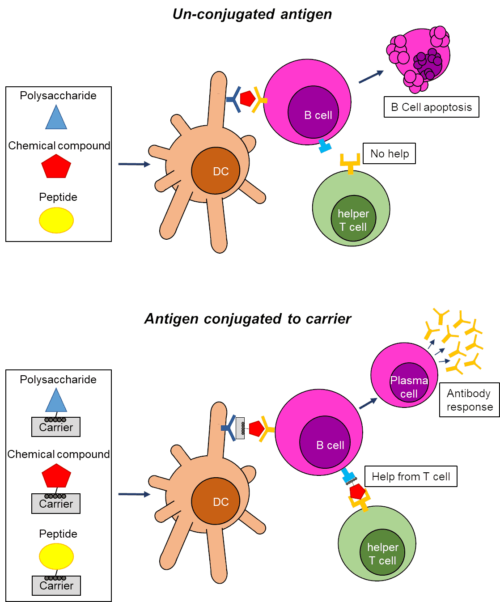Bioconjugation has become a powerful approach to produce well-defined molecular vaccines in which the antigen is linked to an immunogenic carrier – i.e. protein or nanoparticle. Biosynth GmbH is a specialist for bioconjugation with outstanding knowhow in process and analytical methods development. A plethora of different antigens, e.g., polysaccharide, peptide, haptene or small-molecule, are suitable to be connected to protein, peptide, lipid, oligonucleotide, polymer, or nanoparticle carrier. We support customer projects in a variety of conjugate vaccine constructs using common carrier proteins such as CRM197 and tetanus toxoid as well as novel carrier.
Candidate determination
Lead finding using different conjugation and linker strategies
Conjugation process
Development of reliable and scalable conjugation process
Analytical methods
Development and qualification of analytical methods
Vaccine manufacture
Bulk drug substances for tox or first in man studies
Principles of conjugate vaccines
Although vaccination using whole-microbe vaccines has been successful in preventing many infectious diseases, it is not applicable to certain vaccine settings, such as therapeutic vaccines for cancer, or not safe to other vaccine settings, such as vaccines for HIV. Moreover, most live-attenuated vaccines were developed empirically without a clear understanding of their mechanisms of action.
As an alternative approach, disease-specific molecules, i.e. polysaccharides, proteins, peptides or others, may be used directly as antigens for vaccination. However, such antigens suffer from low immunogenicity or short half-life to become efficient vaccines. Therefore, these antigens need to be covalently attached to highly immunogenic carriers, often proteins, to effectively stimulate the immune system (for the mechanism, see the Figure). Currently, conjugate vaccines, are successful on the market as drugs for treating bacterial pneumonia or meningitis.
In addition to anti-bacterial vaccination, the concept of conjugate vaccines may be suited for the treatment of other diseases, such as Alzheimer’s or cancer. This approach relies on disease-specific antigens that are amenable to coupling to an immune stimulating carrier. The conjugation concept may be further used to generate new properties such as multivalency or controlled release via conjugation of antigens to polymers or nanoparticles. Future strategies to design bioconjugates that can produce tailored immune responses against a specific disease will expand our current understanding of how to modulate the immune system.

